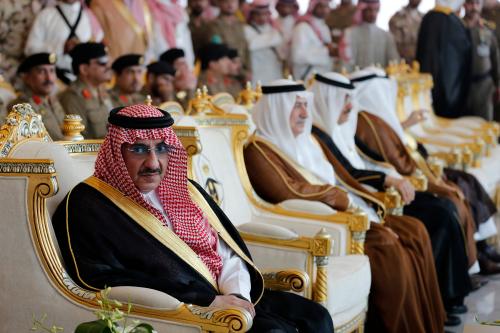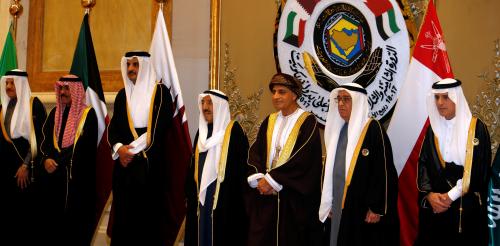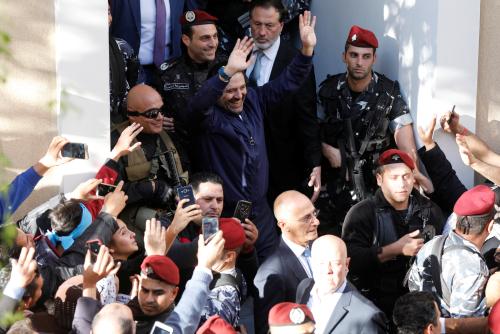A dramatic series of events these past few days has the Middle East on edge: On Saturday, Lebanese Prime Minister Saad Hariri suddenly resigned from his post via Saudi television, accusing Iran of interfering in his country’s affairs. Then that night, Yemeni Houthis—who are backed by Iran—fired a ballistic missile at the Riyadh airport, which was reportedly intercepted. Early Sunday morning Washington-time, President Trump called Saudi King Salman to discuss, among other things, the “continuing threat of Iranian-backed Houthi militias in Yemen.” By Monday, Saudi Arabia stated “we will treat the government of Lebanon as a government declaring war on Saudi Arabia due to the aggression of Hezbollah.”
Are these developments related? The government of Saudi Arabia seems to thinks so.
Whatever the case, the Middle East is entering a new phase of dramatically heightened sectarian tensions that needs to be addressed, lest another country slip into chaos. The United States, whose role it has been for decades to mitigate at least some level of conflict in the Middle East, can and should urge the parties involved to proceed cautiously.
The Hariri piece of the puzzle
But before we dive into the events of this weekend, let’s turn back the clock to early October when Israeli Defense Minister Avidgdor Lieberman raised eyebrows when he said that in the future, Israel would face a unified front from Lebanon, Syria, and Hezbollah, calling them Israel’s collective “Northern Front.” A few weeks later, he accused Hezbollah of shelling the Israeli-controlled Golan Heights. It is precisely because other “unidentified” Israeli military leaders rolled back the claims that it was Hezbollah that had fired the rockets. The result was that it was seen in the region as saber rattling—at least by Lieberman.
Then suddenly, on Saturday November 3, Lebanese Prime Minister Saad Hariri blindsided his allies and closest advisors by resigning from his post. He did so in a speech not in Lebanon, but instead from Saudi Arabia, implying there were threats to his life. He lambasted Iran, saying it “plants sedition, devastation and ruin, which is attested to by its interference in the internal affairs of the Arab nation, in Lebanon, Syria, Iraq, Bahrain, and Yemen, driven by its deep hatred of the Arab nation and an overwhelming desire to destroy and control it.”
Israeli Prime Minister Benjamin Netanyahu swiftly responded to Hariri’s resignation, saying his speech was a “wake-up call to the international community to take action against Iranian aggression.”
The Houthi piece of the puzzle
And then Saturday night, Yemeni Houthis—who are backed by Iran—escalated their conflict with Saudi Arabia by firing a Burkan 2-H ballistic missile at the airport in the capital Riyadh. Thankfully, as Saudi Arabia reports, it was intercepted by a U.S.-supplied Patriot missile system.
In what were the wee hours of Sunday morning Washington-time, President Donald Trump was already involved, with the White House reporting that he had called Saudi King Salman from his Asia trip. They reportedly discussed the “continuing threat of Iranian-backed Houthi militias in Yemen and last night’s intercepted missile in Riyadh,” and Trump thanked King Salman for a $15 billion purchase of the U.S. Terminal High-Altitude Area Defense (THAAD) system.
Do the pieces connect?
By Sunday morning, the Middle East was on edge. I was getting questions from friends in the region asking, on the one hand, if I thought Lieberman’s tough talk and Hariri’s resignation were connected. Was war about to break out in Lebanon? What about the missile shot at Riyadh? Was that an Iranian response, via the Houthis, to the Hariri resignation? Were all three connected?
And what about the phone call from Donald Trump to King Salman? In a region long susceptible to conspiracy theories, Donald Trump’s call to the Saudi king seemed like proof to many that that a scheme was unfolding to goad Iran and Hezbollah into sectarian conflict.
Whatever is going on, for country like Lebanon—which proved itself to be the Middle East’s canary in the coal mine for sectarian conflict when its own sectarian civil war broke out 40 years ago—the Hariri resignation proves it is clearly too weak to withstand the current pressures of renewed military sectarian conflict on Lebanese soil. Many of those who can are thinking of packing their bags.
The rapidly rising tensions have the potential to affect much more than just Lebanon. It wouldn’t be surprising if some of those in Israel who remember the 2006 Israel-Hezbollah war might be dusting off their bomb shelters. In Washington, a worried friend in suburban America explained that his wife was transiting from Dubai to Johannesburg had her flight path adjusted due to the Houthi missile—“should she change her return flight?” While new missile systems may help secure those on land, in a region with the third busiest airport in the world—Dubai—there could be significant economic implications of expanded conflict.
While Washington will almost certainly want to send reassuring words to its allies in the region, it should also urge restraint.
With regional tensions at extraordinarily high levels, it would be wise for all actors in this theater—from Netanyahu to Hezbollah leader Hassan Nasrallah to all others in the region—to tread carefully when events are escalating quickly, lest we find ourselves in another raging military conflict that few ordinary citizens want or need. And while Washington will almost certainly want to send reassuring words to its allies in the region, it should also urge restraint. It should be urging Lebanese leaders to calmly and responsibly react to the Hariri resignation and continue to proceed towards their planned 2018 parliamentary elections. And it should be urging certain Israeli ministers to speak more responsibly, lest it get pushed, politically, toward another war in Lebanon.
Washington should also convey to its Gulf allies that despite their deep frustrations with Iran’s ambitions, yet another war in the region that results in a considerable loss of life and rains down billions of dollars of damage on Lebanon is not in anyone’s interests including their own. Among many other problems that renewed conflict would generate, that would undermine the economic growth that the region so desperately needs to escape its youth unemployment crisis, with rates that are double the global average.
If the United States abdicates its traditional role of calming the situation and helping regional leaders walk back from the edge, we could wake up in a few days with the Middle East’s sectarian conflict escalating to new and unpredictable levels, dashing the hopes of many ordinary citizens there for peaceful, prosperous lives.
The Brookings Institution is committed to quality, independence, and impact.
We are supported by a diverse array of funders. In line with our values and policies, each Brookings publication represents the sole views of its author(s).








Commentary
Hariri’s resignation and why the Middle East is on edge, again
November 7, 2017